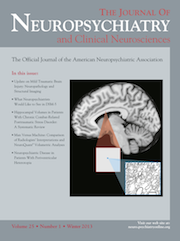Dose-Related Reversible Hypotension During Aripiprazole Treatment
To the Editor: Aripiprazole, a new second-generation antipsychotic, was approved as an effective antipsychotic that could improve negative symptoms and improved cognition for schizophrenia.1 Recently, it has become a common alternative treatment for patients who have inadequate responses to antidepressants. Aripiprazole differs from other antipsychotics because of its partial agonist activity at D2 and 5-HT1A receptors. The available data indicate that aripiprazole is an effective agent, with minimal sedation, metabolic effects, and cardiac toxicity, such as prolongation of the QT interval. Here, we describe the case of a young schizophrenic man who developed dose-related reversible hypotension after the intake of aripiprazole.
Case Report
A 20-year-old Taiwanese man was admitted for psychiatric inpatient treatment because of schizophrenia. The patient presented the symptoms of incoherent speech, disorganized behavior, and delusions of reference. He denied history of drug abuse or cardiovascular disease. Initial laboratory studies revealed normal ranges, with blood pressure of 120/70 mm Hg and heart rate of 60 bpm. An initial electrocardiogram(ECG) revealed normal sinus rhythm. He was treated with aripiprazole 15 mg per day, but he complained of dizziness and weakness, with blood pressure of 65/33 mmHg after aripiprazole 15 mg. Supportive treatment with oxygen were prescribed immediately; the patient felt better 6 hours later, except for dizziness. After this episode, aripiprazole was tapered down to 5 mg per night in the following days. Indeed, his blood pressure returned to a normal range, and he complained of no further symptoms, such as dizziness or chest discomfort, during the following days and nights.
Discussion
Aripiprazole became popular because of fewer cardiovascular effects compared with other typical antipsychotics. However, Egger et al. reported a case of dose-dependent incomplete right bundle-branch block after aripiprazole therapy.2 Similarly, hypertension, abated with discontinuation of aripiprazole, was reported in a case report.3 In contrast, our report tends to support the association between aripiprazole and dose-related reversible hypotension. The mechanism may be due to its α-1 adrenergic-receptor antagonism. Hence, caution should be exercised when initiating aripiprazole therapy in patients with known cardiovascular diseases and in patients with conditions that predispose them to hypotension, such as those on antihypertensive medication. This case serves as a reminder to consider the possibility of developing hypotension even in a young man without earlier heart disease. Also, aripiprazole is an alpha-antagonist, but quite a weak one. There is probably an equal possibility that the patient's BP dropped as a result of a paroxysmal arrhythmia that was unrelated to aripiprazole.
1 : Aripiprazole: pharmacology and evidence in bipolar disorder. Expert Opin Pharmacother 2007; 8:1001–1009Crossref, Medline, Google Scholar
2 : A case of dose-dependent aripiprazole-induced conduction disturbance. J Clin Psychopharmacol 2006; 26:436Crossref, Medline, Google Scholar
3 : Hypertension and aripiprazole. Am J Psychiatry 2005; 162:2392–2392Crossref, Medline, Google Scholar



